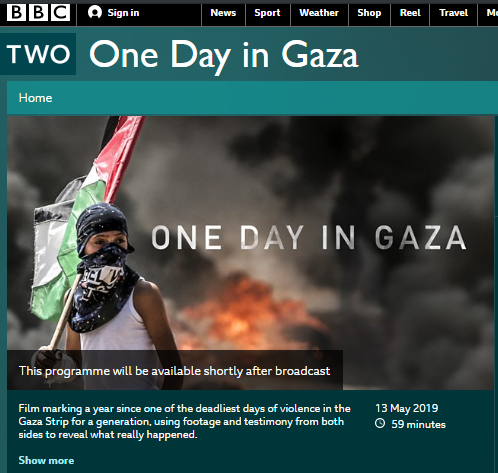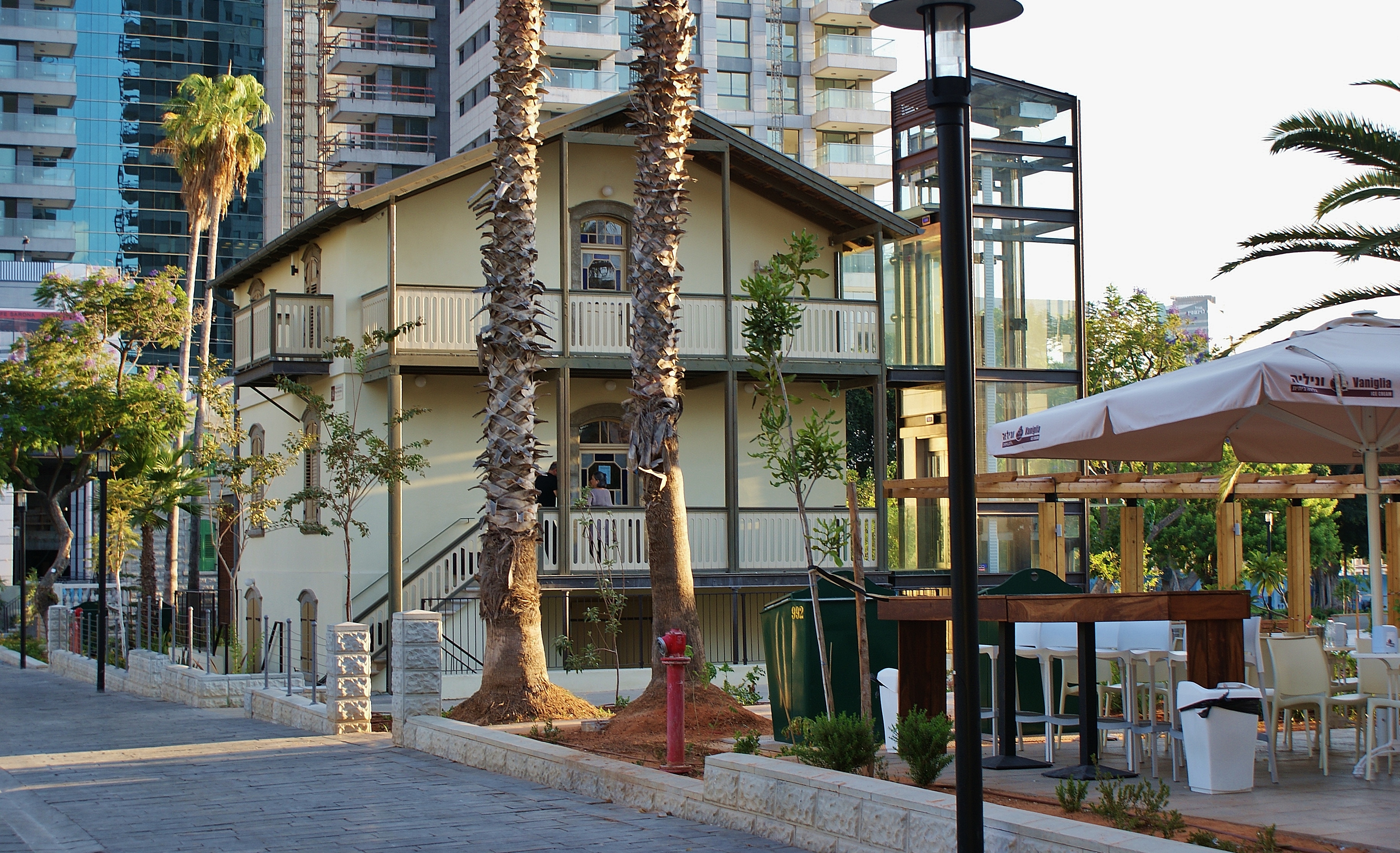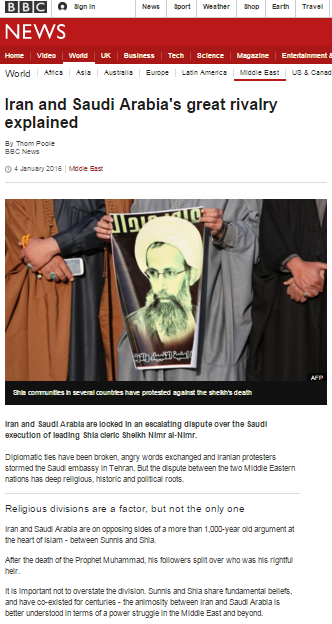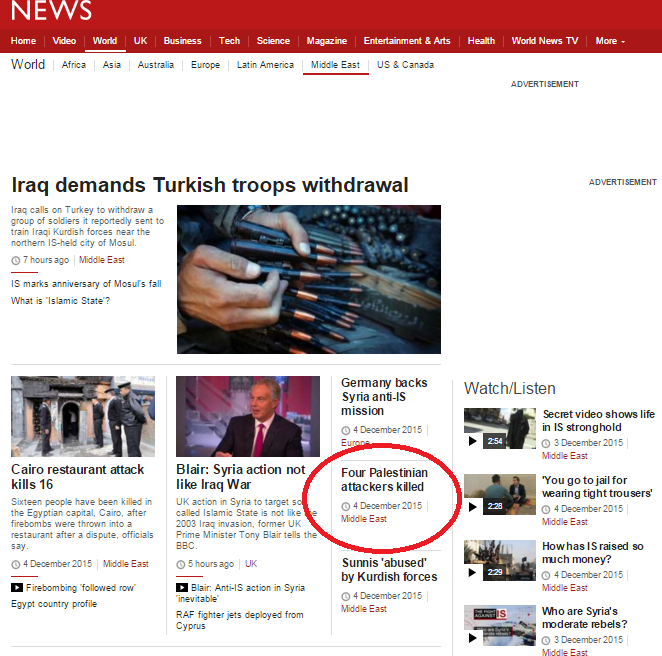The BBC programme ‘One Day in Gaza’ which was aired on BBC Two on May 13th and on PBS in the US the following day has come under criticism from many commentators due to its mistranslation on at least five separate occasions of the Arabic word ‘Yahud’ – Jew – as ‘Israeli’. As the Jewish News reported:
“The BBC has been accused of “playing down” antisemitism after the Arabic word for Jew was mistranslated to Israeli in the English subtitles for a documentary on Gaza border clashes. […]
Among the Palestinian protesters interviewed, 24-year-old Bader Saleh said in Arabic: “I’m not one for fighting or burning tyres, but when I went I was convinced by it.
“The revolutionary songs, they excite you, they encourage you to rip a Jew’s head off.”
But the English translation of Saleh’s remarks offered by the BBC refers to an “Israeli”, not a “Jew”.
This was just one of at least five instances of the Arabic word for “Jew” (Yahud) being mistranslated to “Israeli” in the subtitles.”
The BBC has responded to the criticism as follows:
“A BBC spokesperson said: “We sought expert advice on the translation before broadcast and we believe the translation of ‘Yehudi’ as ‘Israeli’ in this documentary is both accurate and true to the speakers’ intentions.””
As regular readers will know, the issue of the BBC translating the word ‘Yahud’ as ‘Israeli’ is far from new. When it arose in a report by Jon Donnison in 2013 the then BBC Trust responded to a complaint concerning the mistranslation with the ruling:
“that it was not the case that only a literal translation would have met audience expectation for due accuracy.
that no interpretation of the editorial guidelines requires content producers to make direct word-for-word translations without also taking account of relevant context.”
The issue arose again in July 2015 in a film made by Lyse Doucet.
“A BBC documentary has substituted the word “Israelis” for “Jews” in its translation of interviews with Palestinians, its maker has admitted. […]
The BBC’s chief international correspondent said that Gazan translators had advised her that Palestinian children interviewed on the programme who refer to “the Jews” actually meant Israelis.”
Later the same month, another programme translated the word ‘Yahud’ as ‘soldiers’ but complaints concerning both those programmes were dismissed and the 2013 ruling was cited.
Around the same time the BBC demonstrated that its choice of translation depends on the speaker in a report concerning a British Conservative party candidate in which audiences were given an accurate translation of the word ‘Yahud’.
However, that repeated mistranslation is far from the only problematic issue in the film ‘One Day in Gaza’.
1) As has been repeatedly noted here ever since the BBC began covering the ‘Great Return March’ fourteen months ago, audiences have never been properly informed of the background to that agitprop and the BBC has repeatedly downplayed the role of Hamas and other terror groups in its organisation and execution. As we reported here over two weeks before the first day of rioting at the border fence:
“The organizers got a green light from Hamas and the PIJ for the march. “The great return march” Facebook page posted a statement from Issam Adwan, head of Hamas’ department of refugee affairs, who emphasized the necessity and importance of the event. He said it was part of the “resistance” and that it was no less important than the “armed struggle.” He also said that the Land Day march would be only the opening move of a comprehensive global operation. […]
Talal Abu Zarifa, senior figure in the Democratic Front for the Liberation of Palestine (DFLP), said the Palestinian organizations had agreed on activities that would be consistent with the objectives of “the great return march.” […] He added that the organizations had agreed to continue mass recruitment, to make Israel responsible [for what happens] and realize the “right of return”.” [emphasis added]
Over a month before this BBC programme was aired the ITIC had published a report on the organisation of the ‘Great Return March’ in which it noted that:
“Hamas quickly took over the reins and took control of the return marches, even before the first march took place, on March 30, 2018.”
Nevertheless, this BBC film misled audiences with the repeated claim that the events were organised by a “grassroots” movement and that terror factions only joined in later on.
01:02 “But in the Palestinian Gaza Strip a grassroots movement planned a different response.”
25:23: “Trump’s announcement that he would move the US embassy to Jerusalem had been the catalyst for peaceful protests at the fence. Organised by a grassroots movement, at first they weren’t aligned with any political or armed groups.”
26:01: “As the protests grew more popular leaders of groups like Hamas and Islamic Jihad, both regarded by Israel as terrorist organisations, started touring the sites and rallying the crowds.”
2) In common with the BBC’s editorial policy over the past year, this film repeatedly described the ‘Great Return March’ as “peaceful demonstrations” and “protests” despite the fact that violent rioting has characterised the events since their outset.
3) Also in line with much previous BBC coverage, this programme gave viewers a distorted account of events which completely ignores the relevant ‘Jerusalem Embassy Relocation Act’ passed by the US Congress in 1995.
00:42: “After President Trump’s controversial decision to recognise Jerusalem as the capital of Israel, the Middle East braced itself for violence.”
4) As is often seen in BBC coverage of the Gaza Strip, this programme repeatedly referred to the health authority in the Gaza Strip without clarifying that it is run by Hamas – one of the organisers of the violent rioting.
40:46: “…Gaza’s health ministry reported that 37 Palestinians had been killed…”
5) The film’s presentation of the topic of Palestinian refugees was simplistic with no challenge presented to claims of “a legal right of return”, no mention of the context of the invasion of the new Israeli state by Arab countries which led to the creation of a refugee population and no reference to the controversial issue of hereditary refugee status.
03:19: “In Gaza 70% of the people are refugees. Their towns and villages lie beyond the fence.”
14:32: “70% of people in Gaza are descendants of refugees – Palestinians who fled or were forced to flee their land when Israel was created in 1948 and captured territory in the war of ’67. Palestinians across the Middle East have long held that they have a legal right of return to what they see as their homeland.”
6) Despite repeated references from interviewees to ‘occupation’, at no point were viewers informed that Israel disengaged from the Gaza Strip fourteen years ago and that the territory is not ‘occupied’.
37:03: “We’re a politicised people because we’re under occupation.”
7) The film gave viewers a distorted view of how Hamas came to control the Gaza Strip.
06:18: “In 2006 Hamas was elected to power in Gaza and then expelled its rivals.”
The January 2006 election of course did not apply to the Gaza Strip alone – Hamas actually won 74 of the 132 seats in the Palestinian Legislative Council. Eighteen months later it took over the Gaza Strip in a violent coup.
8) The film went on to give a misleading portrayal of Israeli counter terrorism measures. which failed to clarify that restrictions on the import of goods apply solely to dual-use items which can be used for terrorism purposes.
“In response Israel tightened its blockade on the region citing security concerns and strictly controlling all movement of goods and people in and out of the Gaza Strip. Today the economy is in freefall. More than half of Gaza’s two million inhabitants live in poverty and rely on aid. And they’re prevented from leaving what is one of the most densely populated regions on earth.”
Audiences heard nothing whatsoever of the terror attacks which led to Israel’s declaration of the Gaza Strip as hostile territory in September 2007 and no mention was made of the measures – including border closure – imposed by Egypt.
9) Having been told (09:39) that Hamas is “seen in the West as a terrorist organisation”, viewers later saw a Hamas leader claim that:
27:11 “…it is unfair to describe an organisation resisting occupation as ‘terrorist’. The world needs to reconsider these classifications.”
The film again made no effort to explain to viewers that the Gaza Strip is not occupied and that the speaker was in fact referring to Israel as a whole. Neither was it sufficiently clarified that what was previously described (09:39) as Hamas’ “history of suicide bombings and rocket attacks against the Jewish state” puts it squarely under the ‘working definition’ of terrorism used by the BBC in the past.
10) As readers no doubt recall, after the events of May 14th 2018 Hamas claimed that fifty of the 62 people killed on that day belonged to its organisation and the Palestinian Islamic Jihad claimed three of the dead. That clearly relevant Hamas claim was however only communicated to viewers almost at the end of the film.
01:59: “That day would end with at least 60 Palestinians dead or dying and almost three thousand injured.”
54:29: “By the end of the 14th of May 2018 at least 60 Palestinians were dead or dying and over 2,700 were injured. One Israeli was hurt. Hamas later claimed more than 50 of the dead as their own.”
11) Significantly, the film’s closing moments referred to a “UN investigation” into the events with no clarification of the fact that the report concerned was commissioned by the notoriously biased UNHRC.
12) At 50:50 viewers were shown a sequence of footage purporting to depict what was described by one participant in the rioting as follows:
“…the drone came and started dropping gas.”
Although audiences heard additional references to “gas” together with images of people vomiting and convulsing, they were not informed (as they had been earlier at 22:09 in relation to a different event) that the substance was tear gas and were hence likely to go away with inaccurate impressions concerning its nature.
Towards the end of this film audiences saw a Hamas official give a view of the events of May 14th 2018 which sums up Hamas’ overall strategy concerning the ‘Great Return March’.
56:14: “We didn’t expect the occupation to kill so many people, but we always said: if the occupation does that, then it will embarrass itself in front of the world and show its true face.”
Even before the ‘Great Return March’ events began their organisers described their aim as being to stage events “that the whole world and media outlets would watch”. As we see, the BBC’s latest contribution to that PR campaign by Hamas and additional terror factions in the Gaza Strip comes in the form of this hour-long film by Olly Lambert which – despite the promotional claim that it “reveals extraordinary new details of what happened” – actually did nothing of the sort but stayed well within the boundaries of existing BBC framing of this story.
Related Articles:
BBC Trust ESC rules: no requirement to translate accurately
BBC doubles down on its creative translation of ‘Yahud’
BBC does know how to translate ‘Yahud’ – when it is said in the UK
Hamas agitprop requires BBC journalists to brush up on UN resolution
British connections to upcoming Gaza agitprop ignored by BBC News
The BBC’s ‘Great Return March’ great disappearing act




